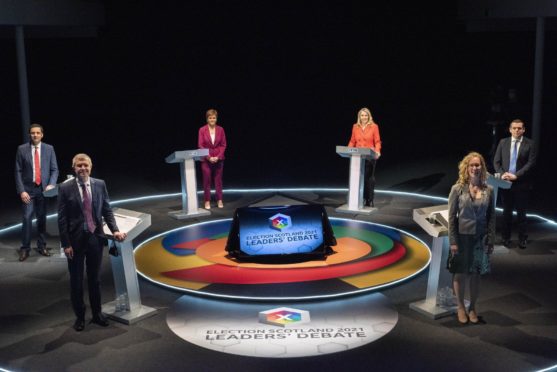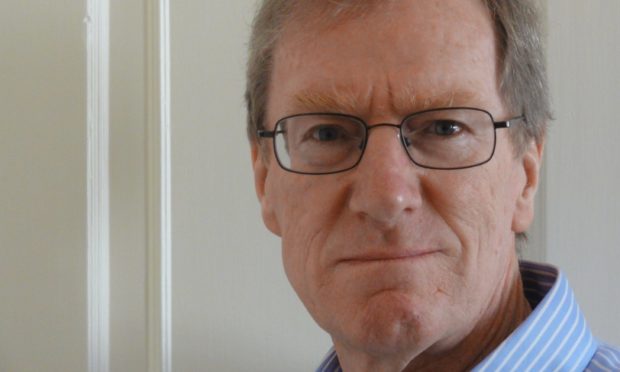The 2021 Scottish parliamentary election could prove to be one of the most important in recent political history.
From the future of the United Kingdom to the post-Covid recovery and the education of our children, there is no shortage of issues at stake.
While the constitution will no doubt feature heavily, we asked pollsters Survation to gauge voters opinions on some of the key issues in Scotland.
Education
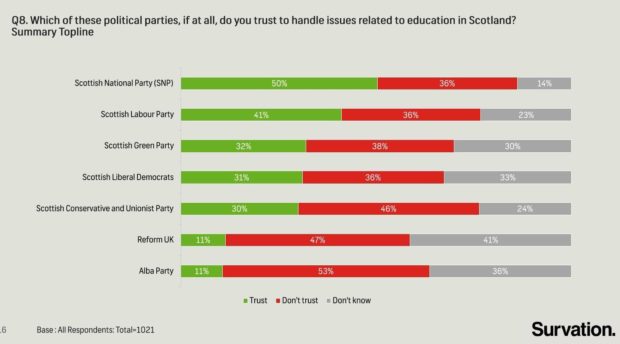
On the 2016 Holyrood campaign trail Ms Sturgeon staked her reputation on closing the schooling gap between rich and poor.
The first minister famously said: “Let me be clear – I want to be judged on this. If you are not, as first minister, prepared to put your neck on the line on the education of our young people then what are you prepared to. It really matters.”
Did the Ms Sturgeon live up to her pledge? A report, published last week, by the Auditor General for Scotland and the Accounts Commission found that the poverty-related attainment gap remains wide and that there were large variations in local authority performance, with some councils’ performance getting worse on some measures.
Asked about her record on Friday, Ms Sturgeon said: “We have narrowed the attainment gap in education, we have improved attainment overall, but there’s still much work to do there.
“Like the rest of the world we have been confronted with a global pandemic which has seen children out of schools for much of the last year, so you won’t get me to stand here and say anything other than there is a lot of work still to do there.”
According to our poll, Scots are satisfied with the SNP’s performance in this area – with 50% saying they trust Ms Sturgeon with the education of their children.
That compares with 41% saying they trust Labour, 32% Greens, 31% Liberal Democrats and 30% for the Tories.
Health
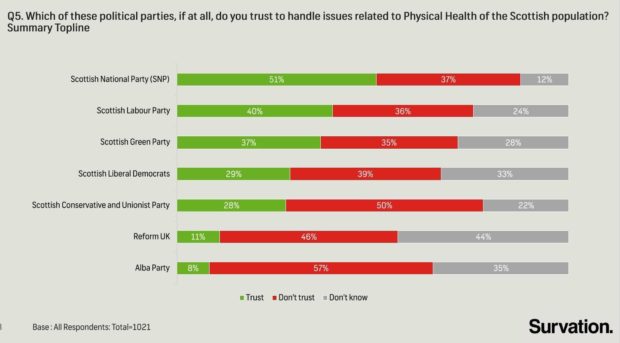
Health has been another major flashpoint over the last five years, not least due to the pandemic.
During the 2019 general election campaign Ms Sturgeon was questioned on issues from waiting times and problems with hospital construction to drug deaths.
But, the first minister’s perceived positive handling of the pandemic in relation to Westminster’s has given the SNP a solid lead on health.
According to our poll, 51% of Scots trust the SNP with their physical health and 48% trust the party with safeguarding their mental health.
Scottish Labour trail the nationalists by almost 10 points on health and the Scottish Tories lag well behind, with 50% of Scots saying they would not trust Douglas Ross with health policy.
Economy
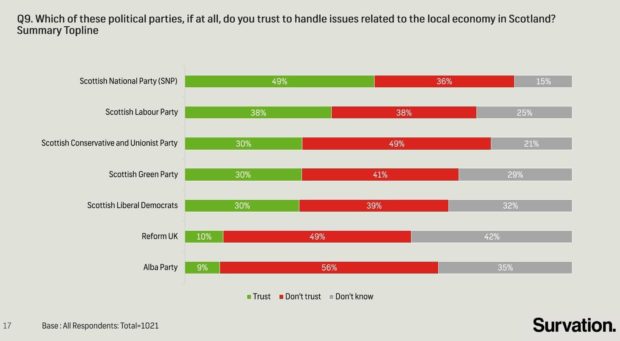
As the health crisis wrought by Covid-19 dissipates, the debate on the economic recovery will dominate.
Indeed, President Joe Biden pitched himself as the “build back better” candidate in last year’s US election – a phrase that has regularly been deployed by Boris Johnson during the pandemic.
Scottish Tory leader Douglas Ross has also often used the phrase to emphasise that his party is focused on the economy rather than the constitution.
But Scottish voters remain steadfast in their belief that Ms Sturgeon is best placed to lead the recovery from Covid.
Almost half of Scots trust the SNP on the economy, that compares with 38% for Labour, 30% for the Tories, 30% for the Greens and 30% for the Lib Dems.
What conclusions can be drawn?
After 14 years in power it is astonishing to see the SNP still polling as high with voters on so many key issues.
Take education for example, Ms Sturgeon herself acknowledges more still needs to be done – but a majority of Scots still back her all the same.
Professor Michael Keating, chair in Scottish politics at Aberdeen University, suggested independence could be influencing voters’ minds on other policy issues.
“It’s very difficult to get a debate on domestic policy, constitutional politics is so dominant that people probably haven’t given a lot of attention thinking about other policy issues”, he said.
“People will often interpret performance on issues in light of their own party preference or where they stand on independence.”
He added: “There’s also the fact that the other parties have been out of government for so long it’s very difficult for them to be seen as having a record that can be judged.”
